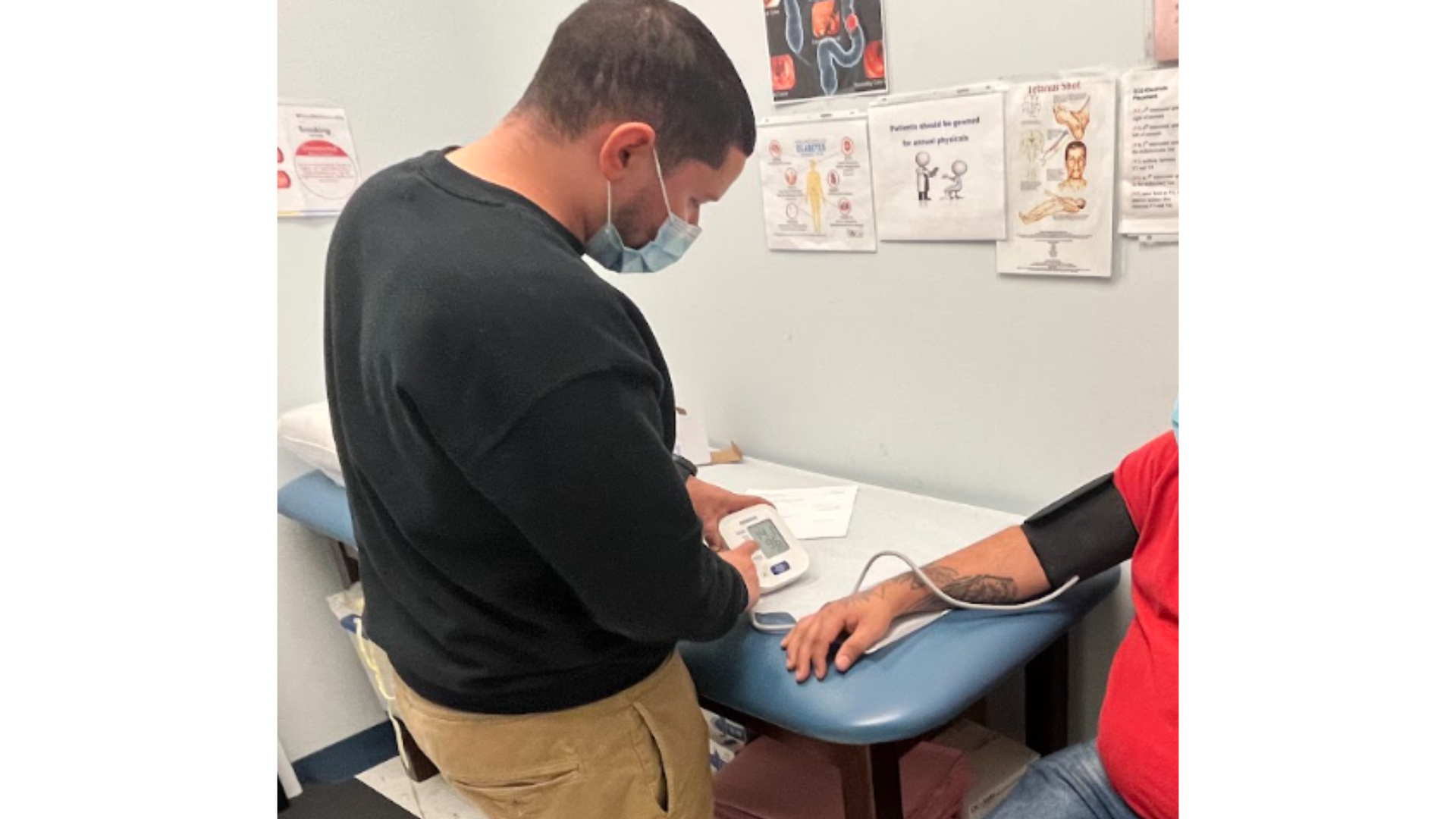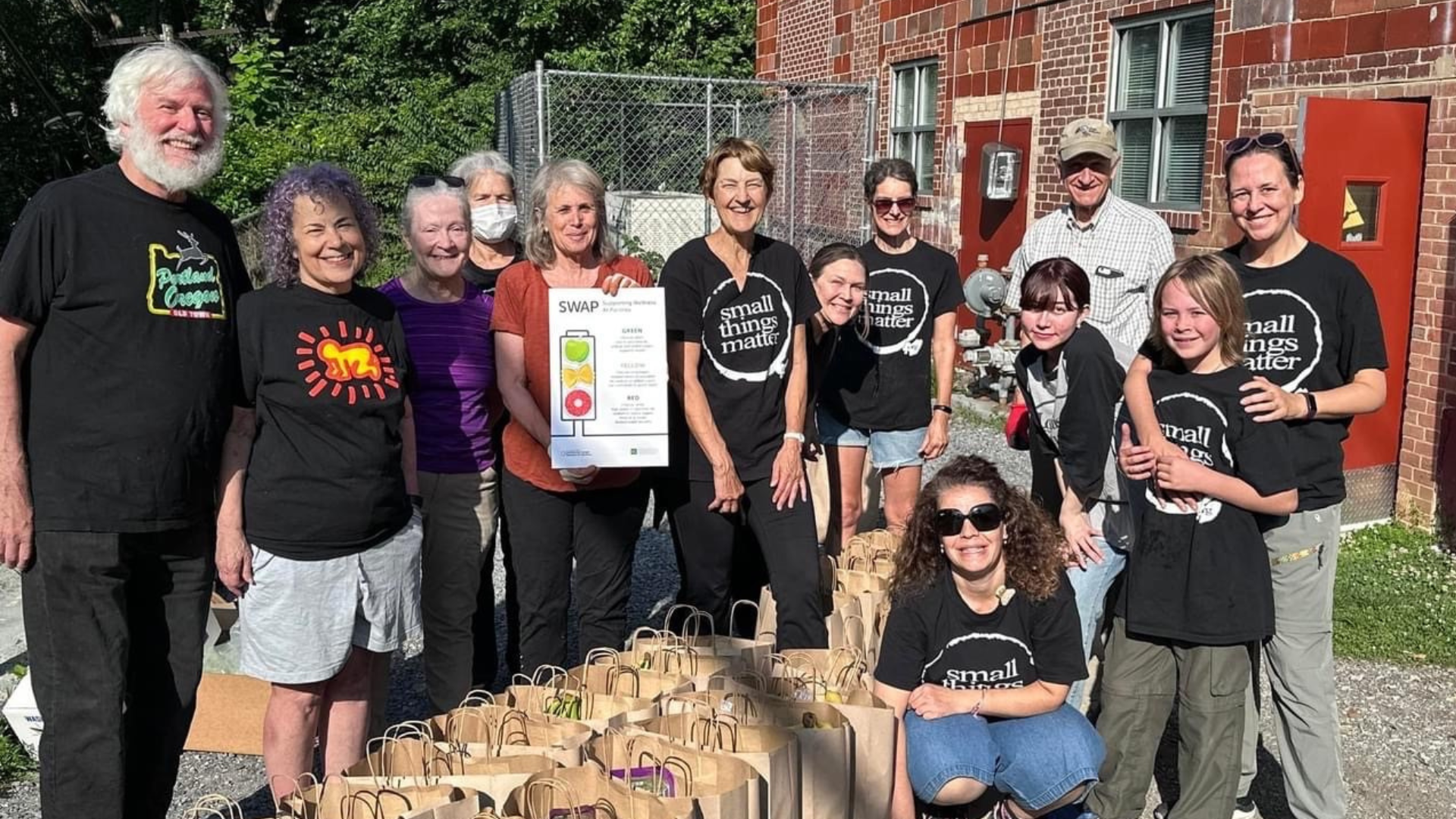For nearly 100 years, the American Heart Association has pioneered scientific advancement, policy change and community impact that gives people everywhere the opportunity for a longer, healthier life. As the leading funder of heart and stroke research, the Association has invested over $5 billion toward lifesaving science. That’s more than any U.S. organization except the federal government. But our impact does not stop there. We’re creating sustainable change in nutrition security, blood pressure management, CPR education and patient outcomes worldwide.
With bold hearts, we are linking arms with YOU – our local volunteers, donors, advocates, survivors, lawmakers, clinical providers and community leaders – to transform how the world understands, treats and prevents cardiovascular disease and stroke.
See the difference we’re making in the Greater Washington Region and across the nation as we forge ahead toward our Second Century of lifesaving impact:
Our Impact on Patient Outcomes:

UnitedHealthcare Grant
Impacting over 380,000 patients through a blood pressure recognition program – Last year, an additional 14,000 patients were treated by providers participating in the Target: BP initiative – the Association’s blood pressure quality improvement program. Approximately one-in-four people in the Greater Washington Region have hypertension, but many are unaware. Blood pressure control is necessary to lower their risk of heart disease and stroke.
Addressing high blood pressure by implementing evidence-based policies and practices – The Association worked with 56 local health centers across the greater DC area to introduce and maintain science-based hypertension control policies. This includes required yearly training for clinical team members, annual skills testing, protocols for consistent blood pressure measurement, and posting infographics where blood pressure screenings are conducted.
Improving outcomes for Americans with heart disease and stroke in our hospitals – 26 Greater Washington Region hospitals and 9 emergency medical services teams are among more than 2,600 nationwide participating in the Association’s Get With The Guidelines® initiative. Hospitals and agencies received 100 awards for their commitment to high-quality, accessible care. The Association also acknowledged 35 clinics for their adoption of our Target: BP, Check. Change. Control. Cholesterol (CCCC), and Target: Type 2 Diabetes initiatives.
Expanding access to self-measured blood pressure (SMBP) monitoring devices – With the Association’s support, the Arlington Partnership for Affordable Housing, Greater Prince William Community Health Center, CCI Health & Wellness Community Service Center, Chinese Culture and Community Service Center, and Muslim Community Center Medical Clinic introduced SMBP monitoring programs. The Association provided automated blood pressure devices benefiting 27,000 people across 27 locations. SMBP monitoring is a proven, cost-effective solution for managing and reducing hypertension.
Combating social determinants of health with UnitedHealthcare – Where someone lives, works and plays should not limit their access to quality health care. Through its Empowering Health program, UnitedHealthcare awarded the Association a grant of $120,000 to further our work to address hypertension and food insecurity in Montgomery County, Maryland. Participating clinics received training, tools and one-on-one support to incorporate nutrition insecurity screening into their workflow as well as connecting patients to food assistance resources.
Breaking down barriers to vaccination – Our We Can Do This Campaign reached over 1,300 local individuals with critical health resources to stop the spread of COVID-19 alongside the Department of Health & Human Services and community organizations including the YMCA of Metropolitan Washington, Langley Park Community Center, Langley Park Civic Association, Prince George’s County Parks & Recreation, and Giant. This collaboration helped to administer more than 50 COVID-19 bivalent boosters and connect hundreds of community members with free healthy meals and fresh produce.
Defeating harmful junk insurance legislation in DC – Alongside 20 organizations, the Association fought to protect access to quality, affordable health care in the District by preventing legislation that would have discriminated against thousands of people with pre-existing conditions.
Expanding postpartum Medicaid coverage in DC – Cardiovascular disease remains the No.1 killer of new moms in the U.S. We drove support for improving outcomes in maternal health care by expanding Medicaid postpartum coverage to 12 months.
Our Impact on Kids and Families:

Photo courtesy of Small Things Matter
Increasing healthy food access for more than 894,000 people each year – Since 2021, the Association has worked with 10 area food banks to screen community members for food insecurity, connect patrons in need to nutrition assistance programs, adopt nutrition standards, increase refrigeration in pantries and more. Our work to increase food access impacts over 74,000 people across our community monthly.
Improving nutrition standards for over 500,000 Maryland families – Last year, the Association offered mini-grants to four Montgomery County, MD community organizations. Funding allowed Small Things Matter, Nourish Now, Rainbow Community Development Center, and Oak Chapel United Methodist Church to better meet the nutritional needs of our community through guidelines that increase the supply and collection of nutritious food.
Giving SNAP a Raise in the District – The Association championed first-of-its-kind legislation, which provides a 10% monthly cash increase to all DC residents who receive Supplemental Nutrition Assistance (SNAP) benefits. This subsidy enables residents to stretch their dollars and afford more healthy, fresh produce.
Ensuring healthy food and drink options on restaurant kids’ meal menus – We created momentum for the passage and implementation of comprehensive kids’ meal laws in Montgomery and Prince George’s Counties, making the healthy choice easier for more than 2 million Maryland families. This first-of-its-kind legislation in Prince George’s County continues to lead the way toward healthier restaurant standards across the state.
Protecting the next generation from being hooked by Big Tobacco – In a multi-year effort, the Association played a critical role in ending the sale of flavored tobacco in the District – including menthol and flavored e-cigarettes – and advocated for $3 million to fund and enforce the law. The policy, which was fully implemented this year, safeguards the health and futures of over 130,000 kids living in DC. But we didn’t stop there. In previous years, the Association has also helped to pass the nation’s highest cigarette tax and become one of the first in the country to raise the age to purchase tobacco to 21.
Advocating for healthy school meals for all – We’re working to keep kids in DC fed for success by championing legislation that ensures all students have access to free school breakfast and lunch. If enacted, this policy would benefit over 95,000 school-aged children in the District.
Improving food security in Ward 8 – Working alongside Covenant Full Potential Development Center and Covenant Baptist United Church of Christ, we provided a refrigeration unit to store fresh produce and introduced guidelines to expand nutrition access for more than 1,000 Ward 8 residents.
Making healthy food more accessible through Produce Rx – Alongside community stakeholders, we advocated for the DC Council to double funding toward the District’s Produce Rx program, which allows providers to prescribe subsidized fruits and vegetables to patients at risk of diet-related conditions. Over 4,500 households struggling to afford healthy food have already benefited.
Connecting families to healthy and affordable food – In collaboration with our local community, we empowered over 1,300 families to prepare healthy, low-cost meals through the Simple Cooking with Heart curriculum and connected thousands more with nutritious food.
Establishing standards to screen newborns for congenital heart disease (CHD) – About 40,000 kids in the U.S. are born with a heart defect each year, and early identification can lead to better long-term outcomes. Through our support of legislation that requires CHD screening using pulse oximetry, over 170,000 newborns are evaluated for heart defects each year in DC, Maryland and Virginia.
Our Work to Build a Nation of Lifesavers:

Van Metre Ashburn Staff CPR Training
Saving lives through Telecommunicator CPR (T-CPR) – We pushed for the passage and funding of a comprehensive T-CPR policy, which ensures 911 call takers are trained to provide lifesaving CPR instructions over the phone. Early CPR can more than double a cardiac arrest victim’s chance of survival. This legislation protects residents of the District and the more than 20 million people who visit DC each year.
Keeping young athletes safe – We are championing local and federal legislation to require cardiac emergency response plans, CPR training for coaches and AEDs on-site at all school-based sporting facilities. Teaming up with community organizations, the Association has helped to place over 300 CPR & First Aid in Youth Sports™ Training Kits in sporting facilities across the East Coast.
Bringing CPR and AED awareness to workforces – More than 2,600 individuals from over 40 local companies tuned into Heart of Greater Washington Serve Day and learned how to respond in a cardiac emergency. Alongside the Association’s Greater Washington Region, several organizations brought CPR demos to their staff this year – helping to teach hundreds of lifesavers!
Challenging our community to “Be the Beat” and learn Hands-Only CPR – The life you are most likely to save with CPR is that of someone you know and love. Thousands across the Greater Washington Region answered the call to become lifesavers by learning CPR last year, including more than 400 Howard University students who completed Damar Hamlin’s #3forHeart™ Challenge.
Our Impact in Schools and Workplaces:

National Youth Heart Ambassadors and Prince William Public School students Chace and Finn
Preparing kids for healthier futures through the Kids Heart Challenge and American Heart Challenge – Over 500 schools in DC, Maryland and Virginia are supporting kids’ physical, mental and emotional well-being by leveraging our science-backed resources in the classroom. Every child deserves the opportunity to reach their full potential, and in 2022, more than 39,000 local kids made the commitment to move more, be kind and take steps to keep their hearts healthy through our in-school programs. Collectively, they have raised over $3.4 million in the fight against heart disease and stroke.
Educating the next generation of lifesavers – Our support of CPR in Schools legislation requires all DC, Maryland and Virginia high school students to learn CPR as a graduation requirement. That’s more than 160,000 new lifesavers trained each year! Through our in-school programs, we reach 2 million families annually with Hands-Only CPR education, and in the 2021-22 academic year, 6,000 students in the Greater Washington Region learned how to save a life by completing Finn’s Mission!
Elevating the stories of our local Youth Heart Ambassadors – In the Greater Washington Region, more than 10 CHD warriors and heart-health champions have been named Youth Heart Ambassadors through the Kids Heart Challenge and American Heart Challenge. As Ambassadors, they share their stories to inspire other kids to take care of their hearts by eating smart, moving more, being kind, avoiding tobacco, getting good sleep, and learning Hands-Only CPR.
Strengthening recognition of stroke warning signs in local communities – During the 2021-22 academic year, over 6,000 DC, Maryland and Virginia families learned how to spot a stroke F.A.S.T. through our in-school initiatives.
Encouraging healthy habits in childhood – Several Greater Washington Region schools participating in the Kids Heart Challenge and American Heart Challenge received $1,000+ grants in 2022 to purchase physical education equipment and introduce new curriculum focused on mindfulness, meditation and yoga.
Creating healthier, more equitable workplaces – Workforce health and well-being programs that are well-designed, fully implemented and rigorously evaluated can lead to better employee health, retention and productivity. In DC, Maryland and Virginia, 19 businesses are utilizing the Association’s Workforce Well-being Scorecard™ to identify and address gaps in employee wellness.
Our Impact on Research and Grant Funding:

Greater Washington Region Heart Walk 2022
Funding local research and science – The Association invested more than $35.3 million across 110 research projects in DC, Maryland and Virginia to revolutionize how we prevent and treat cardiovascular disease.
Contributing over $6.9 million toward our global impact – Supporters across the Greater Washington Region are championing health equity, fueling scientific advancements, and raising lifesaving funds that bring us one step closer to a world of longer, healthier lives for all.
Shifting the inequitable health paradigm – Four Greater Washington Region-based organizations received $800,000 collectively from the Bernard J. Tyson Impact Fund to remove social and economic impediments to health equity. Grants furthered the work of local investees including Clymb (formerly Infinite Focus Schools), Smart from the Start, Urban Ed, and 4P Foods in the areas of food security, mental health, early childhood development and economic stability.
Advancing research in maternal health and hypertension – A $2 million grant through the Association’s Research Goes Red initiative is helping doctors in Fairfax, VA explore how social factors impact blood pressure in women of reproductive age. The program plays a critical role in increasing representation in research and has already engaged over 19,000 women nationwide.
Striving for representation in clinical research – The Strategically Focused Research Network (SFRN) on the Science of Diversity in Clinical Trials awarded $24 million nationwide to projects addressing the lack of diversity, equity and inclusion in clinical trials. Universities and hospital systems across the U.S. are participating in the study including MedStar Washington Hospital Center in Washington, DC and Johns Hopkins Medicine and Morgan State University in Maryland.
Educating future leaders in health equity – Since 2018, the Association has uplifted undergraduate students in their academic pursuits through the EmPOWERED Scholars Program, providing $200,000 in scholarships to scholars across 20+ universities. Four Howard University students committed to dismantling barriers to health equity received scholarships for the 2022-23 academic year.
